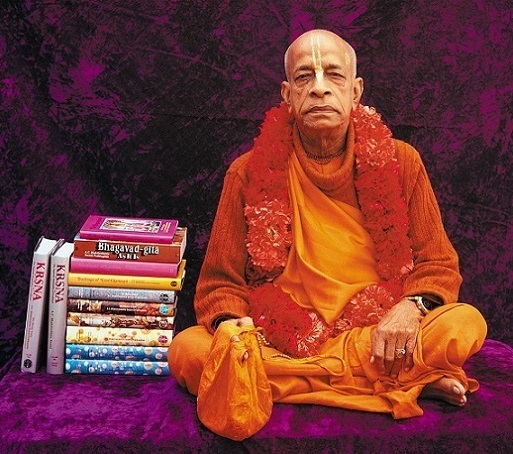(Srila Prabhupada and his beloved books)
"Śrīdhara Svāmī explains, just like swans, they take pleasure in the mānasa-sarovara, in a place where transparent water, lily and very nice garden. They take pleasure. Yathā prasiddha haṁsa mānasi sarasi carantaḥ kamanīya-padma-khanda-nivāsaḥ. You'll find swans, they will gather near the lotus flower and dive there and entangle them with the stem. That is their pleasure, to remain surrounding the lotus flower.
kamanīya-padma-khanda-nivāsa tyakta-vicitrannadi
yukto 'py ucchista-garte kāka-krīḍa-sthāne na niramanti
They are not like the crows, who are simply trying to take some pleasure from the garbage place. That's all. What is there in the garbage? They are all rejected, thrown away. But the crows will go there. They'll pull on something, 'If there is something there, something?' So, as there is a natural distinction between the crows and the swans, similarly, there is distinction between a Kṛṣṇa conscious person and ordinary person. The ordinary persons are compared like the crows, and a fully Kṛṣṇa conscious person is just like swans and ducks.
Then he says,
tad-vāg-visargo janatāgha-viplavo
yasmin prati-ślokam abaddhavaty api
nāmāny anantasya yaśo 'ṅkitāni yat
śṛṇvanti gāyanti gṛṇanti sādhavaḥ
(SB 1.5.11)
On the contrary, this is a kind of literature very nicely written, metaphorical, and poetry, everything. But there is no question of glorifying the Lord. That is compared with, just like the same place, where the crows will take pleasure. On the other hand, other kind of literature, what is that? Tad-vāg-visargo janatāgha-viplavo yasmin prati-ślokam abaddhavaty api (SB 1.5.11). A literature presented to the people, to the public for reading, which are even grammatically incorrect, but because there is glorification of the Lord, it can produce revolution. It can purify the whole human society.
My Guru Mahārāja, when he was selecting articles to be published in The Harmonist, if he sees simply that there is, several times the writer has written 'Kṛṣṇa,' 'Lord Caitanya,' like that, he passes immediately: 'All right. It's all right. (laughter) It is all right.' That so many times he has uttered 'Kṛṣṇa' and 'Caitanya,' so it is all right.
So similarly, even if we present our Back to Godhead or any other literature in broken languages, it does not matter because the glorification of the Lord is there. That is recommended by Nārada. Tad-vāg-visargo janatāgha-viplavaḥ. Janatā agha. Agha means sinful activities. If one reads one line of this literature, although it is presented in broken language, but if he simply hears there is Kṛṣṇa, then his sinful activities immediately vanquish. Janatāgha viplavaḥ. Tad-vāg-visargo janatāgha-viplavo yasmin prati-ślokam abaddhavaty api nāmāny anantasya (SB 1.5.11). Ananta means the unlimited. His name, His fame, His glory, His qualities are described. Nāmāny anantasya yaśo 'ṅkitāni. If glorification is there, even they are presented in broken language, then śṛṇvanti gāyanti gṛṇanti sādhavaḥ. Just like my Guru Mahārāja, sādhu, a saintly person, immediately passes: 'Yes. It is all right.' It is all right. Because there is glorification of the Lord. Of course, general public will not understand... But this is the standard, standard version, spoken by Nārada. You write something; the aim should be simply to glorify the Supreme. Then your literature is pavitra, purified. And however nicely, either literally or metaphorically or poetically, you write some literature which has nothing to do with God, or Kṛṣṇa, that is vāyasaṁ tīrtham. That is pleasure spot for the crows.
This is the version of Nārada Muni. We should be taking note of this. And for the Vaiṣṇava there is one qualification: poetic. You should... Everyone should be poetic. So... But that poetry, that poetry language, should be simply to glorify the Lord. Then it is... Just like Narottama dāsa Ṭhākura, Bhaktivinoda Ṭhākura, Locana dāsa Ṭhākura, they are poets. They have produced so many songs. But about whom? About Kṛṣṇa. Similarly, under the instruction of Nārada, now Vyāsadeva will produce a literature like Śrīmad-Bhāgavatam, which is simply glorification of the Lord and His devotees. Bhāgavata. Bhāgavata means the Lord, and Bhāgavata means pertaining to the Lord. So pertaining to the Lord, everything. Vāstava-vastu vedyam atra. In the beginning of Bhāgavata it is said vāstava-vastu. Vastu means substance, the summum bonum. And vāstava, in relation to the summum bonum.
So if we try to understand everything in relationship with Kṛṣṇa, then we understand vāstava reality. That is reality. If we study something minus Kṛṣṇa, that is not real knowledge. Actually, Kṛṣṇa is the original cause of all. Sarva-kāraṇa-kāraṇam (Bs. 5.1). So unless we come to the point of Kṛṣṇa, any understanding, any knowledge is imperfect."
(Srila Prabhupada Lecture, New Vrindavan, June 6, 1969)
.

